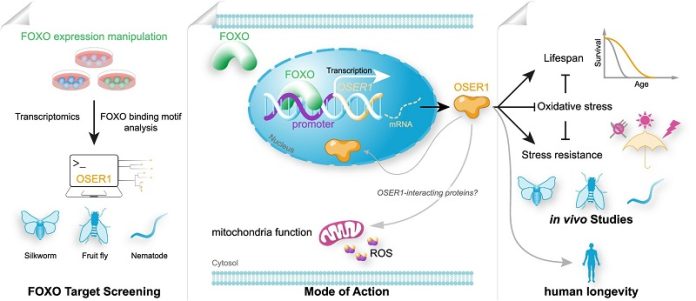
Living a long, healthy life is a goal for many, and there are plenty of tips out there, like getting enough sleep, fasting, exercising, and maintaining a balanced diet.
But scientists are digging deeper to find out why some people live longer than others.
A new discovery by researchers from the Center for Healthy Aging at the University of Copenhagen might help answer that question.
They have found a specific protein, called OSER1, that seems to play a major role in how long we live.
This research was recently published in Nature Communications.
A protein that could extend life
According to Professor Lene Juel Rasmussen, one of the lead researchers, “We’ve identified a protein that can extend life.
This protein exists in a range of animals, like fruit flies, silkworms, and humans.” The fact that this protein is found in many different species suggests that it could have similar effects on human aging.
Zhiquan Li, another key researcher in the study, explained, “We linked the information from animal studies to humans. Since this protein is found in both, it gives us a better idea of whether it could affect human longevity.”
The researchers found the OSER1 protein while studying a group of genes connected to a known longevity regulator called FOXO. By changing the activity of some of these genes, they discovered that OSER1 had the biggest impact on lifespan.
Li pointed out, “We identified 10 genes that changed lifespan, but OSER1 stood out the most.” Knowing how this gene works could help scientists better understand aging in humans and how to protect against age-related diseases like heart disease and neurodegenerative disorders.
New treatments for aging and diseases
The discovery of the OSER1 gene opens up possibilities for future research. Although not much is known about this gene right now, the researchers believe it could eventually lead to new treatments for diseases associated with aging.
“Very little has been published on OSER1, but this is the first time it’s been identified as a key factor in regulating aging and lifespan,” says Li. “Our goal is to better understand how OSER1 works in humans and how it might be linked to diseases we commonly see in older people.”
In the future, the team hopes that learning more about OSER1 will not only help people live longer but also lead to new treatments for age-related conditions.
If you care about wellness, please read studies about how ultra-processed foods and red meat influence your longevity, and why seafood may boost healthy aging.
For more health information, please see recent studies about the power of pickle juice ,and time-restricted eating: a simple way to fight aging and cancer.



